A guarantor of peace
The EU is assuming ever greater responsibility in crisis and conflict regions. And it has laid the foundation for a defence union.

The EU does not have a common army, but it is well on the way towards a European Security and Defence Union: EU countries are aligning their military structures and systems and strengthening them to improve coordination and be able to conduct joint operations. The basis for this is so-called Permanent Structured Cooperation (PESCO), which was agreed by 25 of the 28 EU member states at the end of 2017. With PESCO, the participating EU member states have entered into binding commitments and for the first time declared their readiness to jointly improve their military capabilities in a coordinated way. On this basis, smaller groups of member states are already realising 17 ambitious projects. More projects will follow in autumn 2018 and should contribute decisively to an improvement in the EU’s capacity for action.
At the same time, the EU is working on the professionalisation of civilian crisis management. The member states want to conclude an ambitious Civilian Compact by the end of the year in which they undertake binding pledges to strengthen civilian capabilities. Germany is a trailblazer in this area – for example, thanks to the Center for International Peace Operations – and is contributing many ideas and proposals.
PESCO and the Civilian Compact are two operational approaches that aim to firmly advance the development of the Common Security and Defence Policy (CSDP). The EU member states are to become a unified force and pool their capabilities. In a conflict-prone world, it is important for Europe to be prepared and increase its crisis response capability.
There are now 16 CSDP operations on three continents, including six of a military nature and ten purely civilian operations. In total, roughly 5,000 people are currently deployed around the globe under the blue EU flag, including several hundred from Germany.
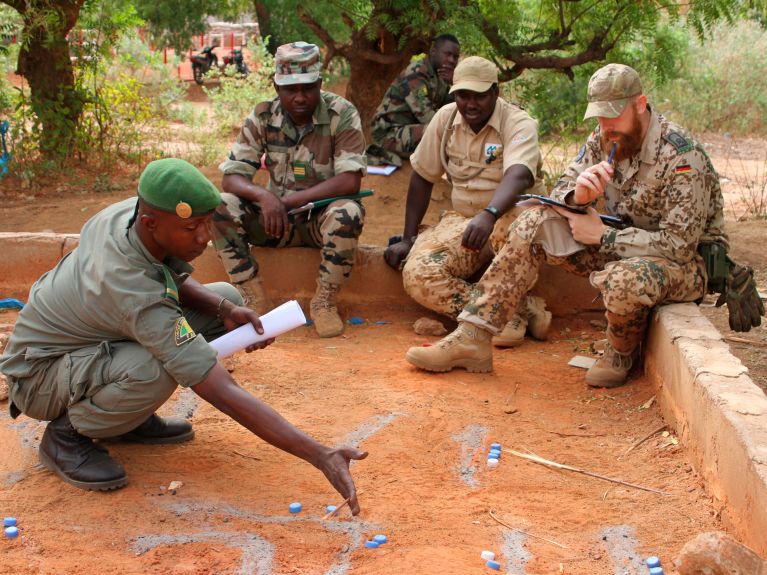
MALI
Training for soldiers and police officers
An enduring conflict continues in northern Mali. Without functioning armed forces, the country will remain at serious risk and entrenched in a tenuous situation. Since the beginning of 2013, the EU has been supporting the Malian army with the European Union Training Mission in Mali (EUTM Mali) at the invitation of the government in Bamako and on the basis of UN Security Council Resolution 2085. The mission aims to train and advise the Malian army so that it can not only maintain the security of the country without foreign support, but also guarantee its territorial integrity. Some 600 military personnel from 25 European countries are currently stationed in Mali, and almost 12,000 Malian soldiers have completed a training programme with EUTM. That represents roughly 60% of all ground forces in the country. Germany is a major provider of troops with a current total of just under 150 soldiers. It will also again assume the leadership of the Mali mission in November. The current EU mandate for EUTM Mali runs until May 2020. Since the beginning of 2014, the EU has also been supporting the police, gendarmerie and national guard with training and advice as part of the civilian EU Capacity Building Mission in Mali (EUCAP Sahel Mali).
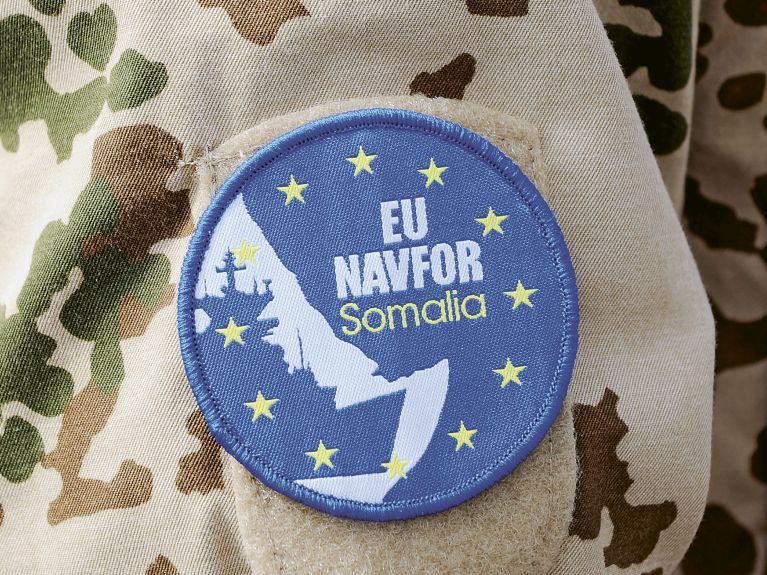
SOMALIA/HORN OF AFRICA
Comprehensive stabilisation
The EU is currently represented in the Horn of Africa by three CSDP operations that build on one another. As a result of EU action on several levels the situation in the Horn of Africa has quietened down significantly. Since 2008, the military EU NAVFOR Somalia Operation Atalanta has protected transports by the World Food Programme and the African Union’s AMISOM mission and contributed to deterring, preventing and combating piracy in this region. Since 2010, the European Training Mission (EUTM) has been supporting the development of a Somali national army by advising the army leadership and training senior officers. The civilian EUCAP mission has been working since 2012 to improve police capabilities in the field of maritime security. Germany supports all three operations and is participating in Atalanta and EUCAP with both civilian and military personnel. A navy reconnaissance aircraft is also regularly deployed within the Atalanta framework. The EU mandate for all three mission runs until the end of 2020.
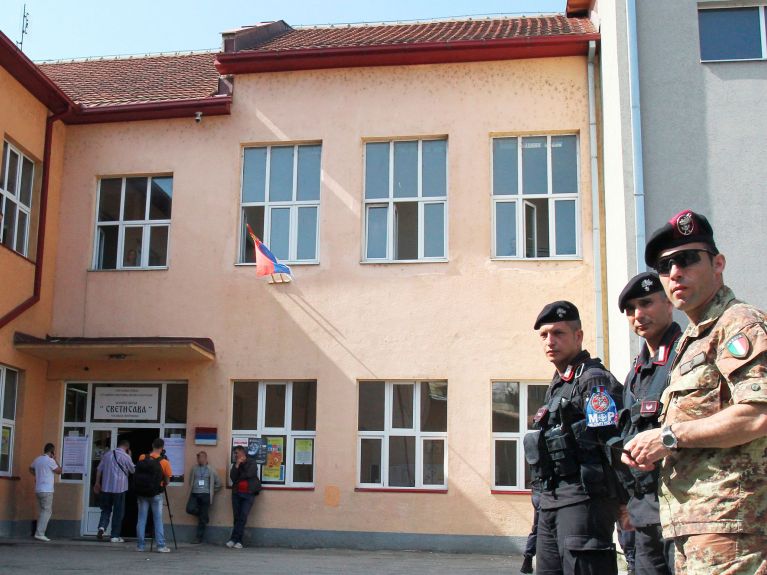
KOSOVO
Building rule-of-law structures
Kosovo’s recent past has been chequered: the small country in the heart of the Balkans experienced a war in 1999 and has had to deal with various political and economic crises since then. This is not least linked to its status as an independent republic which is not recognised by many countries. At the same time, Kosovo’s population consists of a large number of minorities, including Serbs, Turks, Bosniaks, Gorani and Roma. The Kosovan constitution guarantees comprehensive protection for all these minorities. The EU established a rule-of-law mission (EULEX Kosovo) that commenced work in 2009 in order to secure and permanently strengthen this rather fragile territory. The EULEX acronym is used for EU rule-of-law missions within the framework of the Common Security and Defence Policy (CSDP). EULEX is a civilian EU mission that involves the participation of police officers, judges, prison officers and customs officials – some 700 experts are currently deployed on the spot in Kosovo. They are intended to help the country in setting up and developing a multiethnic police force, judiciary and administration and thereby indirectly act against organised crime in the country. Germany’s Federal Police and a number of seconded civilians provide support in Kosovo.
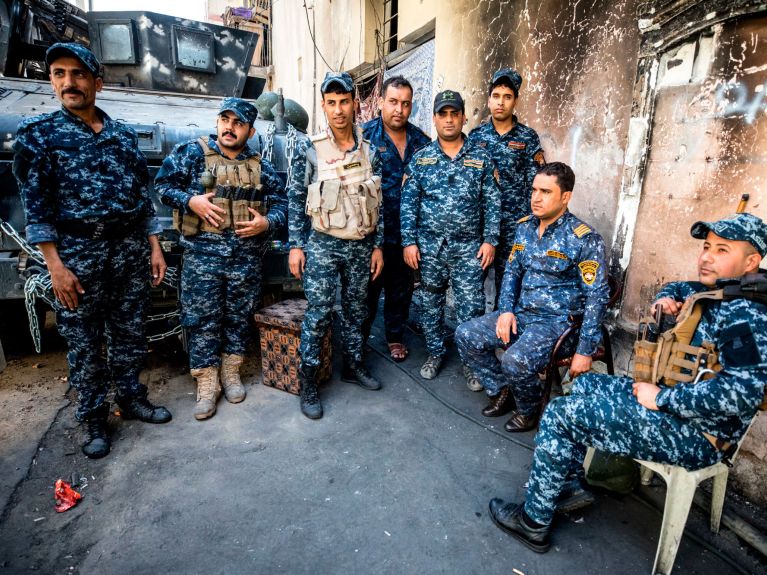
IRAQ
Advice and assistance
Following the end of the struggle against so-called Islamic State (IS), Iraq faces major political, confessional and economic challenges. The government in Bagdad has to guarantee peaceful development and offer economic and social prospects for the population. The European Union Advisory Mission (EUAM Iraq) has been deployed here since November 2017 to assist the country in this complex task. Dr Markus Ritter, an experienced officer in Germany’s Federal Police, was appointed as head of the civilian advisory mission. He and his 35-member team from different European countries are advising the Ministry of the Interior and the Office of the National Security Adviser on developing guidelines and implementing reforms in the security sector. The goal is to enable Iraqi police and other civilian security agencies to effectively combat corruption, terrorism and organised crime in compliance with rule-of-law principles while also respecting and protecting human rights. The EU mandate runs until 2020.
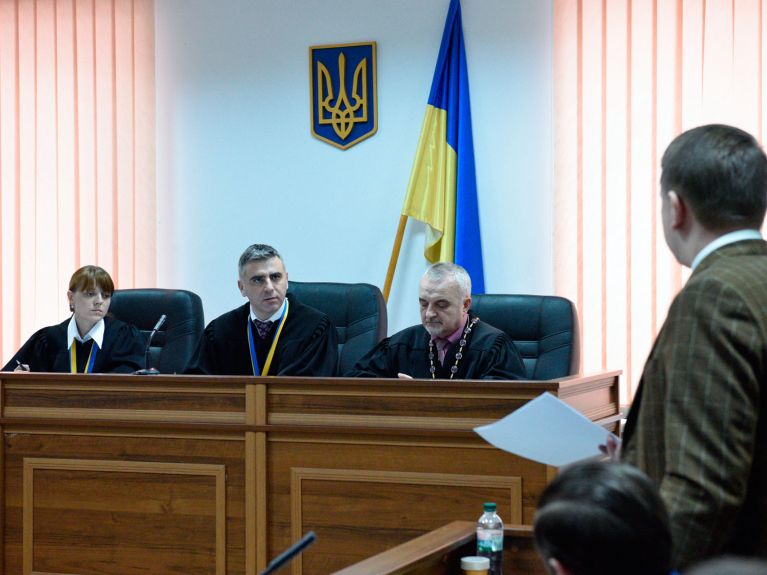
UKRAINE
Creating trust
Recently, 35 public prosecutors from the Odessa region participated in an intensive training course on the treatment of witnesses in court. How do you question and protect witnesses? How do you conduct effective case research? Questions like these and much more were part of the programme offered by the European Union Advisory Mission in Ukraine (EUAM Ukraine) at the end of September 2018. Whereas prosecutors in the eastern European country traditionally base their work on the relevant files, the focus here was on direct interaction with witnesses. However, this course represents only a minute part of the EUAM’s work, which is helping to bring about general reform of the civilian security sector in Ukraine. Some 300 EU experts have been advising their Ukrainian counterparts since 2014, for example, in the judicial system, in the police, in the fight against corruption or with regard to human rights. The goal is as simple as it is difficult: creating a security sector that works, is efficient and consistent – and enjoys public trust.

MEDITERRANEAN
Mission against people traffickers
They are taking action against people traffickers to put an end to the deaths in the Mediterranean. They are supporting the stabilisation of Libya by implementing the United Nations arms embargo and providing training measures for the Libyan Coast Guard. The European Union Naval Force (EU NAVFOR MED Sophia) is a military sea and air operation involving the participation of roughly 1,100 soldiers from 26 countries. Germany is currently taking part in the operation with the frigate Augsburg and almost 200 military personnel. Since June 2015, the operation has been combating the traffickers’ business model over an area of the Mediterranean between the Libyan and Italian coasts that is roughly the size of Germany. The soldiers observe this sea area and attempt to gain a comprehensive picture of the practices used by the smugglers. However, they are also allowed to stop, search and confiscate ships and take suspects on board to later hand them over to an EU member state. So far, over 140 suspected traffickers have been handed over to the Italian authorities and over 400 of their
vessels have been destroyed. In addition, the soldiers have also rescued almost 50,000 people at sea.
Newsletter #UpdateGermany: You would like to receive regular information about Germany? Subscribe here to:
